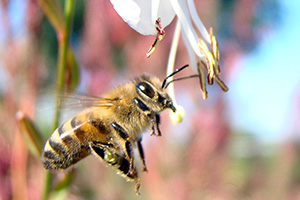
24 Nov Bees get their day in Oregon
The Oregon Legislative hearing on Bee Health and Pesticide Use on November 21 was an important milestone. Lawmakers heard from a number of panelists that pesticides are harming bees.
The day started with Beyond Toxics delivering nearly 12,000 signatures to Katy Coba, the Director of the Oregon Department of Agriculture (ODA) calling for a ban on a class of pesticides labeled neonicotinoids. These pesticides are very toxic to bees and are one of the factors in colony collapse disorder. Beyond Toxics also hosted the Beauty of the Bee Photography Exhibit in the main Galleria, as well as offering tasty treats from crops pollinated by bees (pumpkin pie, figs, apples, and more) to legislators.
At 2:00 pm people packed the hearing room for the Bee Health and Pesticide Use public hearing in the House Committee on Agriculture and Natural Resources. The highpoints I took away from the hearing give me hope that Oregon will soon take meaningful action to protect bees and other pollinators from the threat of extinction by pesticide poisoning:
- All testimony acknowledged that the bee die-offs in Wilsonville and Hillsboro were due to exposure to neonicotinoids. Dr. Paul Jepson from Oregon State University reminded the members of the House Committee that neonics pose risks to birds and aquatic species in addition to bees.
- Katy Coba from the ODA confirmed that, yes, ODA has the authority to place restrictions on pesticide products that are more protective than the federal government.
- Everyone agreed that both the general public and licensed pesticide users need more education about the risks of neonicotinoids. The State will soon require special training about neonicotinoids before someone can get a pesticide license.
- There was agreement that pesticide users can and must do more to communicate with bee keepers about their plans to spray chemicals and be proactive neighbors and partners to protect bees.
Calling it an “unprecedented step,” Katy Coba announced that ODA would restrict two neonicotinoid products from being sprayed on linden trees. Was anyone impressed with this drop in the bucket for bees? Highly doubtful, because the legislators peppered the panelists with many questions about finding alternatives to neonics.
Some members of the House Agriculture Committee as well as other panelists asked about using regulatory curbs with significant restrictions to reduce the risks from neonics. It is good to know that some lawmakers are focused on real solutions and not merely joining in lock-step with the chemical lobbyists.
There is talk of doing something substantive to protect bees in the 2014 legislative session. After all, the work of bees accounts for more than 600 million dollars of profit for farmers in Oregon.
That would be critical because, as expert panelist Alan Turanski from Glory Bee Foods summed it up, “Bees are as important to Oregon’s agricultural sector as water and the sun.”

Lisa Arkin is Executive Director at Beyond Toxics. Prior to her work with Beyond Toxics, Lisa spent thirteen years as an educator and associate professor at both Stanford University and University of Oregon. She has since accumulated deep experience in toxics use reduction advocacy, land use planning, environmental protection and strategic development for non-profit organizations. Lisa has served as Executive Director since 2005.

